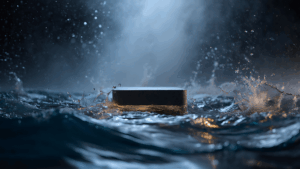The increasing water scarcity around the world is an increasing concern for us all, and many industrial and manufacturing organisations are taking water conservation very seriously. The OECD has predicted that between the year 2000 and 2050, water demand will increase by 55% with the biggest increase coming from the manufacturing sector – 400%. With such huge increases in predicted demand, it is clear that something must be done now to ensure there is enough clean water for the needs of manufacturing as well as the needs of humans and the environment.
Thankfully, the global giants are already planning ahead, with many having plans to become water positive – i.e. to replenish more water than they use – in areas of water scarcity within the decade. In this blog, we look at a few examples.
No Guinness?
In June we were raising a glass to National Beer Day, a celebration of the country’s favourite drinks. But at the same time, global media was reporting fears that climate change is going to have a big effect on water scarcity. Given that water is the most important ingredient in beer – and indeed all alcoholic drinks – where will that leave the alcohol sector?
Guinness is owned by drinks giant Diageo so it’s perhaps unsurprising that The Irish Times focused on the prospect of shortages of Ireland’s national beer. It published an interview with Michael Alexander, Diageo’s global head of water, environment and agriculture sustainability. He highlighted the fact that the global risks of drought are forcing all big water manufacturers, including breweries and distilleries, to adopt strategies to help boost water security.
In 2022, Diageo used 17.5bn litres of water globally. As 43 of its sites are in water stressed areas, the company is not only looking for ways of cutting water usage by 2030, it has also pledged to replenish more water than it uses in the most water stressed areas by 2026. At a vineyard in Turkey, for example, the company worked with local experts to come up with a drip irrigation system which saves 50% of the water previously used. Diageo claims that it has already improved water efficiency in its operations by 50% and that by 2030 each drink will have taken 30% less water in its production.
Whitbread to cut hotel water consumption by a fifth
The hotel giant Whitbread is trialling new water-saving technology in the UK that will help it cut the amount of water per guest by 20% by 2030. The technology, which is being rolled out first in the most water stressed areas of the country, includes WC valves, water-efficient showerheads, and flow restrictors on taps. The move is part of Whitbread’s overall strategy to become net zero by 2040 – part of its Force for Good strategy, which has already achieved water savings of 76k m3 through auditing and leak detection.
PepsiCo’s positive water impact
In 2021, PepsiCo announced its commitment to become Net Water Positive by 2030, by which it means it will “replenish back into the local watershed more than 100% of the water used at company-owned and third-party sites in high-water-risk areas”. It also pledged to use 50% less water – equating to 11 billion litres a year – in high risk watersheds.
In practical terms in some countries, this means rainwater harvesting, recycling water – in one plant in India, this has resulted in 70% reduction in water usage since it was introduced in 2016. In the US, the organisation is investing billions of dollars in projects like wetland restoration and aquifers, and infrastructure development.
You don’t have to be a giant to save water
Of course, it’s not just up to the global industry giants to find ways of becoming water sustainable. Every business can make a difference by implementing a water efficiency strategy and help develop a more water secure future for us all.



